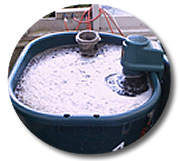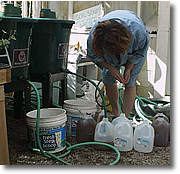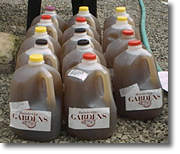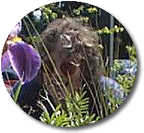| |  |
|
Soil Soup For Gardeners
Ann Lovejoy for Bainbridge Gardens
 Aerobically brewed compost teas are alive, filled with millions of healthy soil biota (living creatures). Because they are oxygen brewed, these teas contain very low pathogen counts (most pathogens are anaerobic, or oxygen-hating) and very high levels of beneficial bacteria (beneficial biota are mostly oxygen lovers). Because they contain living material, aerobic teas must be used quickly. Ideally, they should be used within ten hours of decant time (usually 10 am, so use by 6 pm). Any leftover tea may be added to the compost pile, where it will improve the rate and quality of decomposition. Aerobically brewed compost teas are alive, filled with millions of healthy soil biota (living creatures). Because they are oxygen brewed, these teas contain very low pathogen counts (most pathogens are anaerobic, or oxygen-hating) and very high levels of beneficial bacteria (beneficial biota are mostly oxygen lovers). Because they contain living material, aerobic teas must be used quickly. Ideally, they should be used within ten hours of decant time (usually 10 am, so use by 6 pm). Any leftover tea may be added to the compost pile, where it will improve the rate and quality of decomposition.
 To use these teas, simply spray them directly onto soil and plants (filter tea through cheesecloth to prevent clogging the sprayer. When spraying for the first time on soil or new foliage, use undiluted tea. Two weeks later, spray again, diluting to half strength with water. After that, spray once a month. In gardens that have been chemically maintained and are transitioning to natural care, you can dilute monthly sprays 2:1 with water (two gallons of water to each gallon of tea). In gardens that have been maintained only with organic amendments, monthly sprays may be diluted as much as 8:1 (8 gallons of water to each gallon of tea). As a rule of thumb, the healthier the soil, the healthier the plants. Using soilsoup is like adding several inches of compost to the soil. If your soil has been well amended, go with the higher dilution rate. If your soil has only recently been amended and is not yet splendid, use stronger solutions (more tea, less water). To use these teas, simply spray them directly onto soil and plants (filter tea through cheesecloth to prevent clogging the sprayer. When spraying for the first time on soil or new foliage, use undiluted tea. Two weeks later, spray again, diluting to half strength with water. After that, spray once a month. In gardens that have been chemically maintained and are transitioning to natural care, you can dilute monthly sprays 2:1 with water (two gallons of water to each gallon of tea). In gardens that have been maintained only with organic amendments, monthly sprays may be diluted as much as 8:1 (8 gallons of water to each gallon of tea). As a rule of thumb, the healthier the soil, the healthier the plants. Using soilsoup is like adding several inches of compost to the soil. If your soil has been well amended, go with the higher dilution rate. If your soil has only recently been amended and is not yet splendid, use stronger solutions (more tea, less water).
To promote healthy lawns, spray soilsoup monthly all year round. This is especially helpful where drainage is poor and soil is not well improved. To avoid or minimize foliage disorders such as powdery mildew, black spot, and so on, spray twice a month at leaf emergence (in spring), then monthly. According to Dr. Elaine Ingham, the soil scientist from Corvallis who developed the brewing technology, if we can coat each leaf with 60% coverage (top and bottom), we can avoid all or nearly all of the foliage disorders our plants experience. Foliar spraying is best done in a light rain or when the leaves are damp from rain or being watered. The tea will migrate into the leaf surface, taking up residence and providing ongoing protection against pathogens.
 Soilsoup also offers benefits to the soil, encouraging large populations of healthy soil biota, so spraying beds before and after planting is helpful. It is also useful for treating soil around the root zones of plants that are struggling with diseases, since it can promote a proper balance of healthy soil biota. It may be used to treat or prevent fungal problems as well as common root rots. Used consistently, soilsoup helps improve poor drainage and build lean native soils into robust soils with good tilth. Soilsoup also offers benefits to the soil, encouraging large populations of healthy soil biota, so spraying beds before and after planting is helpful. It is also useful for treating soil around the root zones of plants that are struggling with diseases, since it can promote a proper balance of healthy soil biota. It may be used to treat or prevent fungal problems as well as common root rots. Used consistently, soilsoup helps improve poor drainage and build lean native soils into robust soils with good tilth.
For best results, use teas during or after a rain or after plants have been watered (while still wet). Early morning is also a good time. Consistent use of soilsoup will reduce your gardens fertilizer requirements significantly over time. Soilsoup also encourages deep rooting, making our gardens less dependent on supplemental water during the dry summers. Soilsoup is appropriate for use on native plants as well as ornamentals and is completely safe to use on edible food crops as well.
Apply with pump sprayers or watering can. Be sure that the sprayer has never been used for any toxic substance which would kill the tea biota. This includes Roundup, dormant sprays, tree oils, and any chemical herbicide, pesticide, or moss killer. After use, rinse your sprayer well with plain water. If the soilsoup dries on the sprayer, the resulting biofilm can be cleaned off with rubbing alcohol, then rinsed with plain water.
 Ann Lovejoy is out there... somewhere, in a garden, on a tour, writing a book, helping with a community gardening project or more likely at Bainbridge Gardens. She is Bainbridge Island's gardening guru of all that is green, colorful and organic. To reach Ann's site for more gardening information,
just click this way.
|
|
 |






 Aerobically brewed compost teas are alive, filled with millions of healthy soil biota (living creatures). Because they are oxygen brewed, these teas contain very low pathogen counts (most pathogens are anaerobic, or oxygen-hating) and very high levels of beneficial bacteria (beneficial biota are mostly oxygen lovers). Because they contain living material, aerobic teas must be used quickly. Ideally, they should be used within ten hours of decant time (usually 10 am, so use by 6 pm). Any leftover tea may be added to the compost pile, where it will improve the rate and quality of decomposition.
Aerobically brewed compost teas are alive, filled with millions of healthy soil biota (living creatures). Because they are oxygen brewed, these teas contain very low pathogen counts (most pathogens are anaerobic, or oxygen-hating) and very high levels of beneficial bacteria (beneficial biota are mostly oxygen lovers). Because they contain living material, aerobic teas must be used quickly. Ideally, they should be used within ten hours of decant time (usually 10 am, so use by 6 pm). Any leftover tea may be added to the compost pile, where it will improve the rate and quality of decomposition. To use these teas, simply spray them directly onto soil and plants (filter tea through cheesecloth to prevent clogging the sprayer. When spraying for the first time on soil or new foliage, use undiluted tea. Two weeks later, spray again, diluting to half strength with water. After that, spray once a month. In gardens that have been chemically maintained and are transitioning to natural care, you can dilute monthly sprays 2:1 with water (two gallons of water to each gallon of tea). In gardens that have been maintained only with organic amendments, monthly sprays may be diluted as much as 8:1 (8 gallons of water to each gallon of tea). As a rule of thumb, the healthier the soil, the healthier the plants. Using soilsoup is like adding several inches of compost to the soil. If your soil has been well amended, go with the higher dilution rate. If your soil has only recently been amended and is not yet splendid, use stronger solutions (more tea, less water).
To use these teas, simply spray them directly onto soil and plants (filter tea through cheesecloth to prevent clogging the sprayer. When spraying for the first time on soil or new foliage, use undiluted tea. Two weeks later, spray again, diluting to half strength with water. After that, spray once a month. In gardens that have been chemically maintained and are transitioning to natural care, you can dilute monthly sprays 2:1 with water (two gallons of water to each gallon of tea). In gardens that have been maintained only with organic amendments, monthly sprays may be diluted as much as 8:1 (8 gallons of water to each gallon of tea). As a rule of thumb, the healthier the soil, the healthier the plants. Using soilsoup is like adding several inches of compost to the soil. If your soil has been well amended, go with the higher dilution rate. If your soil has only recently been amended and is not yet splendid, use stronger solutions (more tea, less water). Soilsoup also offers benefits to the soil, encouraging large populations of healthy soil biota, so spraying beds before and after planting is helpful. It is also useful for treating soil around the root zones of plants that are struggling with diseases, since it can promote a proper balance of healthy soil biota. It may be used to treat or prevent fungal problems as well as common root rots. Used consistently, soilsoup helps improve poor drainage and build lean native soils into robust soils with good tilth.
Soilsoup also offers benefits to the soil, encouraging large populations of healthy soil biota, so spraying beds before and after planting is helpful. It is also useful for treating soil around the root zones of plants that are struggling with diseases, since it can promote a proper balance of healthy soil biota. It may be used to treat or prevent fungal problems as well as common root rots. Used consistently, soilsoup helps improve poor drainage and build lean native soils into robust soils with good tilth.